This year I read nearly all of the Hugo nominees for best novel and best novella, because my husband and I get to vote for the winners. Voting closes at the end of this month and the results will be announced at WorldCon at the awards ceremony August 18 (we bought a non-attending ticket so we could vote). It’s a preferential ballot, meaning you get to rank each of the finalists in order of preference.
Here are my thoughts on the nominees.
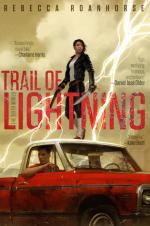
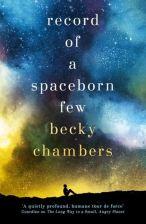
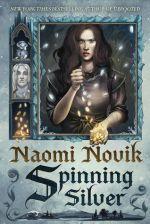
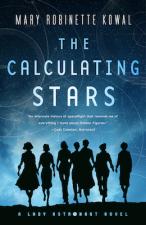
Nominees for Best Novel
- The Calculating Stars, by Mary Robinette Kowal (Tor)
- Record of a Spaceborn Few, by Becky Chambers (Hodder & Stoughton / Harper Voyager)
- Revenant Gun, by Yoon Ha Lee (Solaris)
- Space Opera, by Catherynne M. Valente (Saga)
- Spinning Silver, by Naomi Novik (Del Rey / Macmillan)
- Trail of Lightning, by Rebecca Roanhorse (Saga)
My thoughts:
First off, I didn’t read Revenant Gun by Yoon Ha Lee, because it’s part of a series I haven’t read. I tried starting the series and it didn’t grab me, so I passed on that one.
My husband didn’t love Space Opera, so I decided not to read that one either.
That leaves four books that are all quite different, and all good.
Spinning Silver, by Novik, is written in much the same style as Uprooted. It’s a take on Eastern European fairy tales like Rumpelstiltskin, as referenced in the title, though it’s not a retelling of any one fairy tale. It features Jewish characters which I quite appreciated. Novik’s writing style is dense, detailed and character-driven. There’s a fantastic wintry world and a complicated villain. My only issue with Spinning Silver was similar to my issue with Uprooted; these are fantastic stories with interesting characters, yet the story failed to grab me emotionally.
Trail of Lightning, like Spinning Silver, features folklore we don’t often get in fantasy. Here it’s a mix of Native American folklore, which I loved. I really liked the character and the story. Roanhorse’s storytelling isn’t as strong as Novik’s, and the story falters a bit towards the end. It would have benefited from more of Novik’s detail and character development. But I enjoyed it very much and have great hope for the sequel.
I adored Record of a Spaceborn Few. I was surprised, because I didn’t love the first book in the series, which had too many characters and the stories mostly felt like they’d been done before. Chambers clearly set out to write a diverse, female-centric science fiction novel, which is great, but it felt a little self-conscious to me. I liked the second in the series better, and I really loved the third book. Why did I love it? Chambers’ worldbuilding is fascinating in this one. She sets much of the book in a socialist space station where everyone has an income and a job but life is traditional and structured. In contrast, the outside world is dangerous and unpredictable. Those on the space station think about getting out of their bubble and the outside world has little understanding of life “inside”. Within this framework, Chambers focuses on a few families, and she develops interesting characters and creates situations with a real emotional punch. I found myself teary a few times with this one, and yet it’s also really thoughtful.
The Calculating Stars: I had read two books by Kowal (Shades of Milk and Honey and Ghost Talkers) that didn’t wow me, but I loved the idea of this one and the first chapter hooked me immediately. This book had it all for me; it’s an interesting alternate history set in the 1950’s, it’s about space exploration, and it has two Jewish lead characters. It has a strong female character and raises a number of interesting issues. For example, the main character struggles with anxiety and has to consider how that anxiety (and possible medication) will affect her career. She also has to balance her ambition and the needs of her family, and she has to consider how best to advocate for women while also considering racial equity.
Who I’m voting for: a tough choice but we’re going with Calculating Stars first, then Spaceborn Few second.
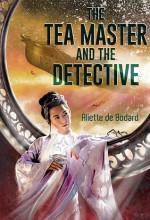
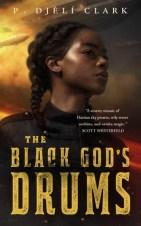
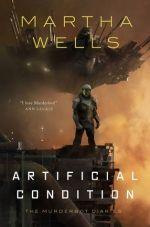
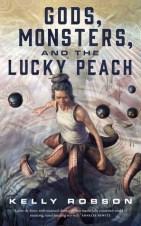
Nominees for Best Novella
- Artificial Condition, by Martha Wells (Tor.com publishing)
- Beneath the Sugar Sky, by Seanan McGuire (Tor.com publishing)
- Binti: The Night Masquerade, by Nnedi Okorafor (Tor.com publishing)
- The Black God’s Drums, by P. Djèlí Clark (Tor.com publishing)
- Gods, Monsters, and the Lucky Peach, by Kelly Robson (Tor.com publishing)
- The Tea Master and the Detective, by Aliette de Bodard (Subterranean Press / JABberwocky Literary Agency)
My thoughts:
Novellas are not a format I love, because I feel it’s just not enough time to get into a work of fiction. At least with a book of short stories an author can build common themes and connections across characters, and you can see how the stories contribute to a larger whole. Novellas tend to feel unfinished to me.
Martha Wells’ novellas have been the exception for me. I have found each of them to be excellent, with fascinating world-building and character development, and each has brought a new layer to the story. Unfortunately, Artificial Condition fell flat for me. I can’t say why, I just didn’t gravitate to the characters or the story in this one, as I did with the previous three.
I like Seanan McGuire quite a bit, but I’m not a huge fan of this series, which focuses on children who fall into other worlds and then are devastated when they end of back in this world. There’s a dreamy tone to the writing but I find it overstated. Readers have to be told over and over again how tormented these children are. I found Sugar Sky a mildly entertaining read but didn’t love it.
It’s been a while since I read Binti, so it’s at a bit of a disadvantage here. The Binti novellas are all excellent but I found myself wishing they were simply one novel. Okorafor’s world-building is complex and was at times hard to follow unless you read all the novellas close together. That’s my only complaint in this fantastic series which I highly recommend.
Both The Black God’s Drums and Tea Master and the Detective were new authors for me, and I enjoyed both novellas, but I’m not sure how much either one stuck with me. Black God’s Drums is an alternate history set in New Orleans. I enjoyed the setting but didn’t find the story long enough or very compelling. Tea Master was more interesting – I love a good science fiction mystery, and I was interested in the concept of using tea blends as a way of helping people endure space travel. I was also interested in the use of an AI (a mindship) as a main character. I found the story a bit confusing, but enjoyed it overall.
My favorite was Gods, Monsters, and the Lucky Peach. It’s a time travel story, with characters in the future going back to explore the Tigris and Euphrates in 2000 BC. I found this story a bit slow going at first but then I was riveted. The two main characters are really interesting and I loved the way this book blended future dystopia, ecological disaster, time travel, and ancient life. I wanted this book to keep going, but at the same time I was fascinated by the way it ended. This is Robson’s first book and I look forward to reading more.
Who I’m voting for: Kelly Robson’s Gods, Monsters, and the Lucky Peach. And then probably Binti and Tea Master.
That’s my take on this year’s Hugo nominees. There are quite a few other categories with nominees, including best short story, series, graphic story, and dramatic presentation. But in the interest of time I focused on these two. Which of these books have you read, and which ones do you think should win?

